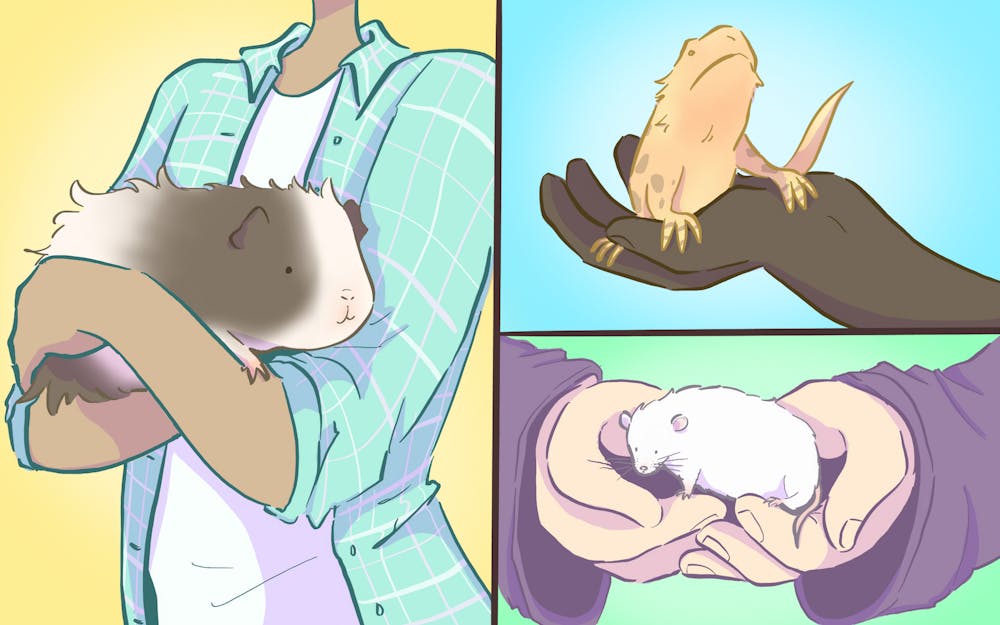Editor's note: All opinions, columns and letters reflect the views of the individual writer and not necessarily those of the IDS or its staffers.
If you’ve ever lost a pet, you know that feeling of wanting to be with them again.
Ever since my sister and I lost our precious guinea pigs two years ago, we constantly think about holding them, petting them and seeing them run around on the floor together. We see tons of guinea pigs on Instagram and at pet stores, which only fuels this desire to want to have guinea pigs again.
We adopted our guinea pigs from Friends of Petraits, a Chicago-based rescue that has all kinds of pets up for adoption. Since our guinea pigs passed away, the woman that runs the organization lets us stop by every once in a while to hold any guinea pigs she might have at the moment. I love being able to do this, and it’s such a great way to be with guinea pigs without having to adopt them. And on the plus side, the guinea pigs get great experience being picked up and held, so that when their future owner adopts them, it won’t feel so stressed and scared. It’s a win-win on both sides.
Unfortunately, going to Chicago isn’t always convenient. We have to carve out half the day for this adventure: an hour to get there, plus an hour with the guinea pigs, and so on. So my sister and I usually visit pet stores to get our little fill of seeing piggies.
It's difficult to talk about both rescues and pet stores, though, since they are so different from each other. PETA has accused pet shops of treating animals as "fashion accessories” sold to “anyone who plunks down a credit card.” Pet stores are businesses that only care about selling animals, so they typically reject contact from customers because they don’t want their products to get sick or injured. They only let someone hold the animal if they are purchasing it. Animal rescues, on the other hand, are more serious about who adopts what animal. There are foster programs that see if a person is right for their animal and vice versa, and some rescues let people hold the animals to get acquainted with them or just to be with them.
Looking at guinea pigs and other small animals is fun, but they look so sad and lonely, it makes us want to hold them. We’ve asked before, but the employees always say no. And it makes sense. There are health risks to both the animal and the person, and it can be difficult to let people hold it without buying the animal first. But I think something could work. As long as the person is experienced with said animal, and they agree to sign a form that says they will deal with the consequences if that animal gets injured or sick, or if the person gets injured or sick from this interaction, it could work. I might sound crazy, but there are benefits to this for everyone involved.
Firstly, the person holding the animal benefits. It’s no secret that animals do wonders for our mental health. For example, studies have found that interacting with animals has shown decrease in stress levels, lower blood pressure, reduced loneliness, increased feelings of social support and a boosted mood. And even if they’re not our pets, being near an animal can make us happy. Whether you’re seeing a dog while walking to class, petting your friend’s cat, or briefly holding a guinea pig, just a small interaction with that animal will bring you joy.
Secondly, the animal benefits as well. Having that animal experience human interaction could benefit their future, especially if it is a skittish animal, like a guinea pig, a hamster, or a mouse. Nothing sucks more than getting a pet only to have it be mean, violent or resentful towards their owner. Pets need experience to get used to being around us. Human-Animal Interaction can have positive results for animals, such as reduced anxiety and health benefits, according to The University of Arizona College of Veterinary Medicine.
Aside from professional research, I have personal backup for this. Take my guinea pig, Moose, for example. I would hold him multiple times a day and for a good hour each time, so he got very acquainted with being picked up and held. Whenever he was put into my arms, he would melt like butter. He would fully lay down on me, which is rare for guinea pigs to do, and if I moved, he wouldn't bat an eye. He was relaxed at all times, despite being a prey animal. This goes to show that even though guinea pigs are known for their skittish behavior, they can get more comfortable through practice and little interactions. And this is the same for any animal.
Animals in pet stores are lonely enough as they are, living in their small cages and experiencing the same things every day. They rarely get any love, and never experience human interaction until they get adopted, which could take months, if not, years. These animals need proper social skills to become their future owners’ best friends.
Evelyn Strauss (she/her) is a freshman studying international studies and human biology.






